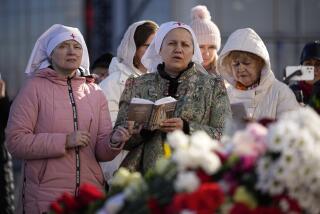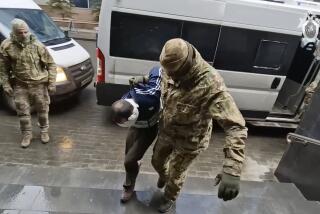Qatar Arrests 2 Russians in Chechen Rebel Leader’s Killing
- Share via
MOSCOW — The Persian Gulf nation of Qatar on Thursday announced the arrest of two Russians as suspects in the recent assassination of an exiled Chechen separatist leader.
Moscow confirmed that the two were intelligence agents but proclaimed their innocence and blasted Qatar for the action.
It is a “provocation,” said Russian Foreign Minister Igor S. Ivanov, for the Arab country to link the Russian agents to the Feb. 13 car-bomb killing of Zelimkhan Yandarbiyev, a leader of Chechen rebels in 1996 and 1997. Yandarbiyev, Moscow said, remained a key terrorist fundraiser until his death in the capital, Doha.
On the night of Feb. 18, Qatari authorities used “weapons and rough physical force” to detain three “employees of Russian special services,” including one who carried a diplomatic passport, Ivanov said in a statement released by the Foreign Ministry.
The three were in Qatar, he said, to visit the Russian Embassy there and to carry out “tasks of an informational and analytical character connected with countering international terrorism, without any violations of local laws.”
Ivanov said one of the men -- presumably the one with diplomatic immunity -- was released after negotiations.
Other exiled Chechen leaders and a former KGB officer said there was little doubt that Moscow arranged the assassination.
“They are trying to kill prominent Chechens who are living abroad and are not really hiding,” said Akhmed Zakayev, special representative in Europe of ousted Chechen President Aslan Maskhadov, who led the republic during a period of de facto independence in the 1990s and is now a guerrilla leader.
“I know that I should be on their hit list too,” Zakayev said by telephone from Copenhagen. “But for now I feel very safe in Denmark.”
Chechens exercised self-rule in their Caucasus republic after defeating Russian troops in a 1994-96 war, but Russian forces returned in 1999 and have battled guerrillas since.
Boris Labusov, a spokesman for the Russian Foreign Intelligence Service, successor to the Soviet-era KGB, said, “We have nothing to add to the exhaustive statement of Foreign Minister Igor Ivanov.”
On the night of the assassination, Labusov told the Russian news agency Itar-Tass that Moscow had discontinued foreign assassinations long ago.
“Neither the Foreign Intelligence Service nor the First Main Department of the Soviet KGB have taken part in such actions since 1959, when Bogdan Stashinsky killed Stepan Bandera in Germany,” he said. The victim was a Ukrainian nationalist leader living in exile, and the KGB assassin defected to the West in 1961.
Ivanov devoted much of his statement to criticizing Qatar for harboring Yandarbiyev, insisting that Qatar, not Russia, broke international law.
Both the United Nations and the United States had included Yandarbiyev on lists of international terrorists subject to financial and other sanctions. He was believed to have been living in Qatar for at least three years.
“All states are obligated to try in court or extradite terrorists to those countries where they committed crimes,” Ivanov said. “Russia more than once, including at the highest levels, appealed to Qatar with persistent demands to hand over Yandarbiyev, who was personally guilty of the deaths of hundreds of Russian citizens.”
Ivanov reiterated Russia’s contention that Yandarbiyev played a key role in the 2002 seizure of a Moscow theater by Chechen rebels. The standoff ended with 129 hostages’ deaths, nearly all from a gas used by security forces who stormed the building. All 41 hostage takers also died, many of them were shot.
Usman Ferzauli, another representative in Denmark of the self-proclaimed Chechen government-in-exile, said it was true that Yandarbiyev had spoken by telephone with the leader of the hostage takers during the theater seizure, as claimed by Russian intelligence, which apparently monitored the conversation.
“But why don’t they make public the transcript of the entire conversation then?” he asked. The truth, he said, is that Yandarbiyev had been urging the release of all the hostages.
Konstantin Preobrazhensky, a former KGB officer living in Washington, said in a telephone interview that Russian intelligence services have “grown much more arrogant and aggressive” at home and abroad since the 1990s.
“You can even see it here in the United States, in the way some journalists ask their questions and some diplomats behave,” he said. “This aggressiveness is now characteristic of the entire law-enforcement system in Russia. The special services once again feel completely invulnerable inside the country and they also feel much less vulnerable in their operations abroad.”
The former officer said he had no doubt the assassination in Qatar was the work of Russian intelligence agents.
“They are returning to the old practices,” he said. “They don’t care for the West’s opinion anymore. They think they have succeeded in recruiting Western leaders to the point where they trust Russia as their partner so much that they will ignore this operation as part of the ongoing international struggle against terrorism.”
But Konstantin Kosachev, chairman of the foreign policy committee of the lower house of parliament, accused Qatar of having political motives in falsely implicating Russia.
“This is an unprecedented violation of the norms of international law,” Kosachev said in comments carried by Itar-Tass. “It would be extremely undesirable to see the Qatari officials sacrifice normal relations with Russia for any sort of tactical or momentary interests.”
*
Times staff writer Sergei L. Loiko contributed to this report.
More to Read
Sign up for Essential California
The most important California stories and recommendations in your inbox every morning.
You may occasionally receive promotional content from the Los Angeles Times.













